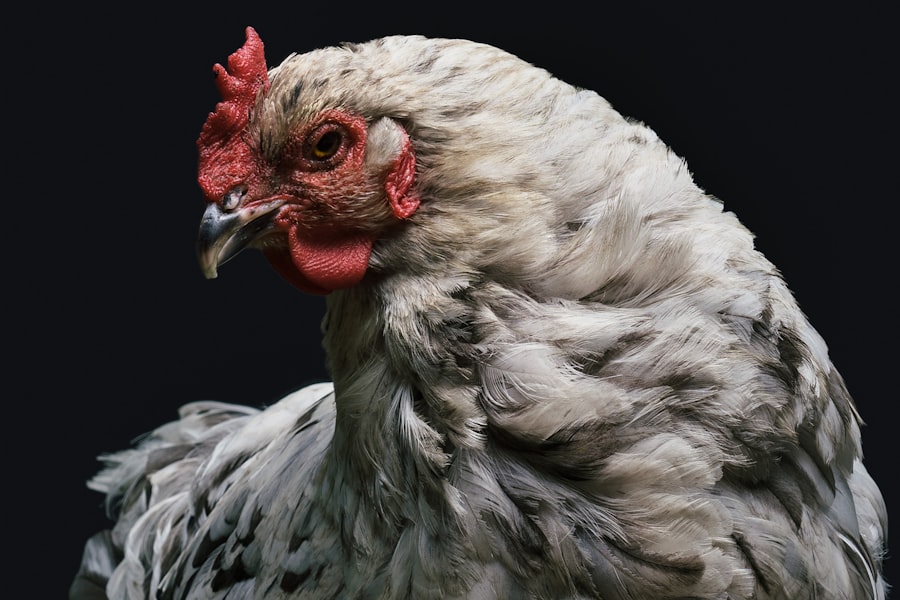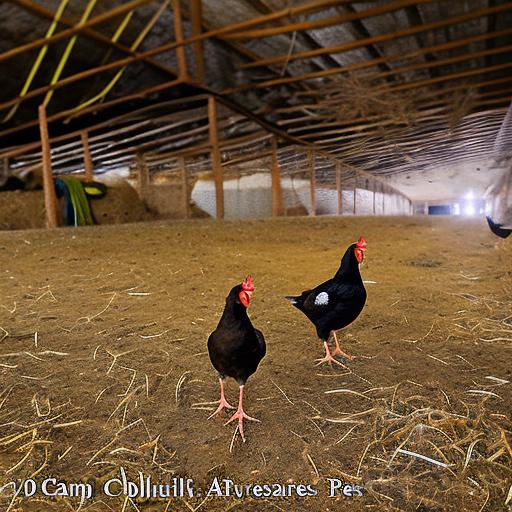Keeping chickens in the barn has become increasingly popular in recent years, as more and more people are discovering the joys and benefits of backyard chicken keeping. Not only do chickens provide a sustainable source of fresh eggs, but they also make great pets and can be a fun and educational experience for the whole family. In this article, we will explore the benefits of keeping chickens in the barn, factors to consider before getting started, choosing the right chicken coop, and how to maintain a clean and safe environment for your feathered friends.
Key Takeaways
- Keeping chickens in the barn can provide a variety of benefits, including fresh eggs, natural pest control, and fertilizer for gardens.
- Before deciding to keep chickens in the barn, it’s important to consider factors such as local regulations, space requirements, and potential predators.
- Choosing the right chicken coop for the barn involves considering factors such as size, ventilation, and ease of cleaning.
- Materials needed for building a chicken coop in the barn may include wood, wire mesh, roofing materials, and nesting boxes.
- Maintaining a clean and safe chicken coop in the barn involves regular cleaning, providing fresh water and food, and monitoring for signs of illness or injury.
Benefits of Keeping Chickens in the Barn
One of the main benefits of keeping chickens in the barn is having a daily supply of fresh eggs. There is nothing quite like collecting eggs from your own backyard and knowing exactly where they came from. Fresh eggs are not only delicious but also packed with nutrients that are beneficial for your health. Additionally, having your own chickens means you have control over their diet and can ensure that they are raised in a healthy and humane way.
Another benefit of keeping chickens in the barn is having a sustainable food source. With concerns about food security and the environmental impact of factory farming, many people are turning to backyard chicken keeping as a way to take control of their own food production. By raising your own chickens, you can reduce your reliance on store-bought eggs and support a more sustainable and ethical food system.
Chickens also make great pets. They are social animals that can be surprisingly affectionate and entertaining to watch. Many people find that spending time with their chickens is a great way to relax and de-stress. Chickens can also be a wonderful educational experience for children, teaching them about responsibility, animal care, and where their food comes from.
Factors to Consider Before Keeping Chickens in the Barn
Before getting started with keeping chickens in the barn, there are several factors to consider. First and foremost, it is important to check local laws and regulations regarding backyard chicken keeping. Some areas have restrictions on the number of chickens you can keep or require permits. It is important to familiarize yourself with these regulations to ensure that you are in compliance.
Another factor to consider is the space requirements for keeping chickens in the barn. Chickens need enough space to move around comfortably and engage in natural behaviors such as scratching and dust bathing. The size of your barn will determine how many chickens you can keep, so it is important to plan accordingly.
Lastly, it is important to consider the noise and smell factor. While chickens are generally not very noisy, they do make some noise, especially when they are laying eggs or if they feel threatened. Additionally, chickens do produce waste, so it is important to have a plan for managing and disposing of their waste in a way that is sanitary and does not create unpleasant odors.
Choosing the Right Chicken Coop for the Barn
Choosing the right chicken coop is crucial for keeping chickens in the barn. A good chicken coop provides a safe and comfortable environment for your chickens to live in. There are several factors to consider when choosing a chicken coop, including size, design, and ease of cleaning and maintenance.
When it comes to size, it is important to provide enough space for your chickens to move around comfortably. The general rule of thumb is to allow at least 4 square feet of space per chicken inside the coop and 10 square feet per chicken in the outdoor run. This will ensure that your chickens have enough room to stretch their wings and engage in natural behaviors.
In terms of design, there are several types of chicken coops available, including traditional wooden coops, mobile coops, and modular coops. Each type has its own advantages and disadvantages, so it is important to choose one that suits your needs and preferences. For example, if you have a small backyard, a mobile coop may be a better option as it can be easily moved around to different areas of your yard.
Ease of cleaning and maintenance is another important factor to consider when choosing a chicken coop. Chickens produce waste, so it is important to have a coop that is easy to clean and maintain. Look for coops with removable trays or floors that can be easily cleaned and sanitized. Additionally, make sure the coop has good ventilation to prevent the buildup of ammonia and other harmful gases.
Chicken Coop Design and Size
Designing a chicken coop that is functional and practical is essential for keeping chickens in the barn. The design of your coop will depend on the size of your barn and the number of chickens you plan to keep. It is important to provide enough space for your chickens to move around comfortably and engage in natural behaviors.
When it comes to size, as mentioned earlier, it is recommended to allow at least 4 square feet of space per chicken inside the coop and 10 square feet per chicken in the outdoor run. This will ensure that your chickens have enough room to stretch their wings and move around freely. It is also important to provide enough roosting space for your chickens to sleep comfortably.
In terms of design, there are several key features that every chicken coop should have. These include nesting boxes for your hens to lay their eggs, roosting bars for them to sleep on, and a secure door or gate to keep predators out. Additionally, it is important to have good ventilation in the coop to prevent the buildup of ammonia and other harmful gases.
Materials Needed for Building a Chicken Coop in the Barn

When building a chicken coop in the barn, it is important to use high-quality materials that are durable and easy to clean and maintain. The materials you will need will depend on the design and size of your coop, but some common materials include wood, wire mesh, and roofing materials.
Wood is the most common material used for building chicken coops. It is sturdy, easy to work with, and provides good insulation. When choosing wood for your coop, it is important to use untreated or naturally rot-resistant wood, such as cedar or redwood. Avoid using pressure-treated wood, as it contains chemicals that can be harmful to your chickens.
Wire mesh is another important material for building a chicken coop. It is used to create the walls and windows of the coop, allowing for good ventilation while keeping predators out. When choosing wire mesh, make sure to use a heavy-duty gauge that is strong enough to withstand predators and other potential threats.
Roofing materials are also important for protecting your chickens from the elements. There are several options available, including metal roofing, asphalt shingles, and corrugated plastic panels. Choose a roofing material that is durable, weather-resistant, and easy to install.
Steps to Constructing a Chicken Coop in the Barn
Constructing a chicken coop in the barn can be a fun and rewarding DIY project. Here are some steps to follow when building your own chicken coop:
1. Plan and design your coop: Before getting started, it is important to plan and design your coop. Consider factors such as size, layout, and materials needed. Draw up a detailed plan or use an online coop design tool to help you visualize your project.
2. Gather materials: Once you have a plan in place, gather all the materials you will need for building your coop. This includes wood, wire mesh, roofing materials, screws or nails, and any other necessary tools or supplies.
3. Build the frame: Start by building the frame of your coop using the wood you have chosen. Cut the pieces according to your measurements and assemble them using screws or nails. Make sure the frame is sturdy and level.
4. Install the walls and windows: Once the frame is complete, install the walls and windows of your coop using the wire mesh. Cut the mesh to size and attach it securely to the frame using staples or screws. Make sure there are no gaps or openings that predators can get through.
5. Add the roof: After the walls and windows are in place, add the roof to your coop. This can be done using metal roofing, asphalt shingles, or corrugated plastic panels. Make sure the roof is securely attached and provides adequate protection from the elements.
6. Install nesting boxes and roosting bars: Once the basic structure of your coop is complete, install nesting boxes for your hens to lay their eggs and roosting bars for them to sleep on. These can be made from wood or purchased pre-made.
7. Add finishing touches: Finally, add any finishing touches to your coop, such as a door or gate, ventilation openings, and any other features you desire. Make sure everything is secure and functional before introducing your chickens to their new home.
Maintaining a Clean and Safe Chicken Coop in the Barn
Maintaining a clean and safe chicken coop is essential for the health and well-being of your chickens. Regular cleaning and maintenance tasks are necessary to prevent the buildup of waste, parasites, and disease.
One of the most important tasks is cleaning out the coop on a regular basis. This involves removing all bedding material, such as straw or wood shavings, and replacing it with fresh bedding. It is also important to remove any droppings or debris from the coop and sanitize it with a mild disinfectant.
In addition to regular cleaning, it is important to perform regular inspections of your coop to ensure that it is safe and secure. Check for any signs of damage or wear and tear, such as loose wires or broken boards. Repair or replace any damaged parts as needed to prevent predators from getting in and your chickens from escaping.
Regularly check your chickens for signs of illness or parasites. Look for any changes in behavior, such as decreased appetite or lethargy, as well as physical signs such as feather loss or abnormal droppings. If you notice any signs of illness or parasites, consult a veterinarian for proper diagnosis and treatment.
Feeding and Caring for Chickens in the Barn
Feeding and caring for chickens in the barn is relatively straightforward. Chickens are omnivores and require a balanced diet that includes a combination of grains, protein, fruits, vegetables, and fresh water.
There are several types of feed available for chickens, including commercial pellets, crumbles, and mash. These feeds are formulated to provide the necessary nutrients for healthy growth and egg production. It is important to choose a high-quality feed that is appropriate for the age and breed of your chickens.
In addition to commercial feed, it is also important to provide your chickens with fresh fruits and vegetables as treats. Chickens enjoy a variety of fruits and vegetables, such as apples, carrots, lettuce, and tomatoes. These treats not only provide additional nutrients but also help keep your chickens entertained and engaged.
Fresh water is essential for the health and well-being of your chickens. Make sure to provide clean, fresh water at all times. It is important to regularly check and clean the water containers to prevent the buildup of algae or bacteria.
Enjoying the Rewards of Keeping Chickens in the Barn
Keeping chickens in the barn can be a rewarding and fulfilling experience. Not only do chickens provide a sustainable source of fresh eggs, but they also make great pets and can be a fun and educational experience for the whole family. By following the steps outlined in this article and providing proper care and maintenance, you can enjoy the benefits of keeping chickens in your own barn. So why not consider adding some feathered friends to your life and start enjoying the rewards of backyard chicken keeping?
If you’re considering keeping chickens in your barn, you may also be interested in learning about converting a shed into a chicken coop. This informative article from Poultry Wizard provides step-by-step instructions on how to transform a shed into a comfortable and functional space for your feathered friends. From insulation and ventilation to nesting boxes and roosting bars, this guide covers everything you need to know to create a cozy home for your chickens. Check out the article here for all the details.
FAQs
Can I keep chickens in the barn?
Yes, you can keep chickens in the barn. However, there are certain factors to consider before doing so.
What are the factors to consider before keeping chickens in the barn?
You need to ensure that the barn is well-ventilated, has enough space for the chickens to move around, and is free from predators. You also need to provide them with nesting boxes, perches, and access to food and water.
What are the advantages of keeping chickens in the barn?
Keeping chickens in the barn can protect them from harsh weather conditions, predators, and diseases. It can also make it easier to collect eggs and clean up after them.
What are the disadvantages of keeping chickens in the barn?
Keeping chickens in the barn can lead to a buildup of ammonia and other harmful gases, which can be detrimental to their health. It can also be more difficult to maintain proper hygiene and prevent the spread of diseases.
What are the alternatives to keeping chickens in the barn?
You can keep chickens in a coop or a run, which can provide them with access to fresh air and sunlight while still protecting them from predators. You can also allow them to free-range in a fenced area, which can provide them with more space to move around and forage for food.
Meet Walter, the feathered-friend fanatic of Florida! Nestled in the sunshine state, Walter struts through life with his feathered companions, clucking his way to happiness. With a coop that’s fancier than a five-star hotel, he’s the Don Juan of the chicken world. When he’s not teaching his hens to do the cha-cha, you’ll find him in a heated debate with his prized rooster, Sir Clucks-a-Lot. Walter’s poultry passion is no yolk; he’s the sunny-side-up guy you never knew you needed in your flock of friends!







